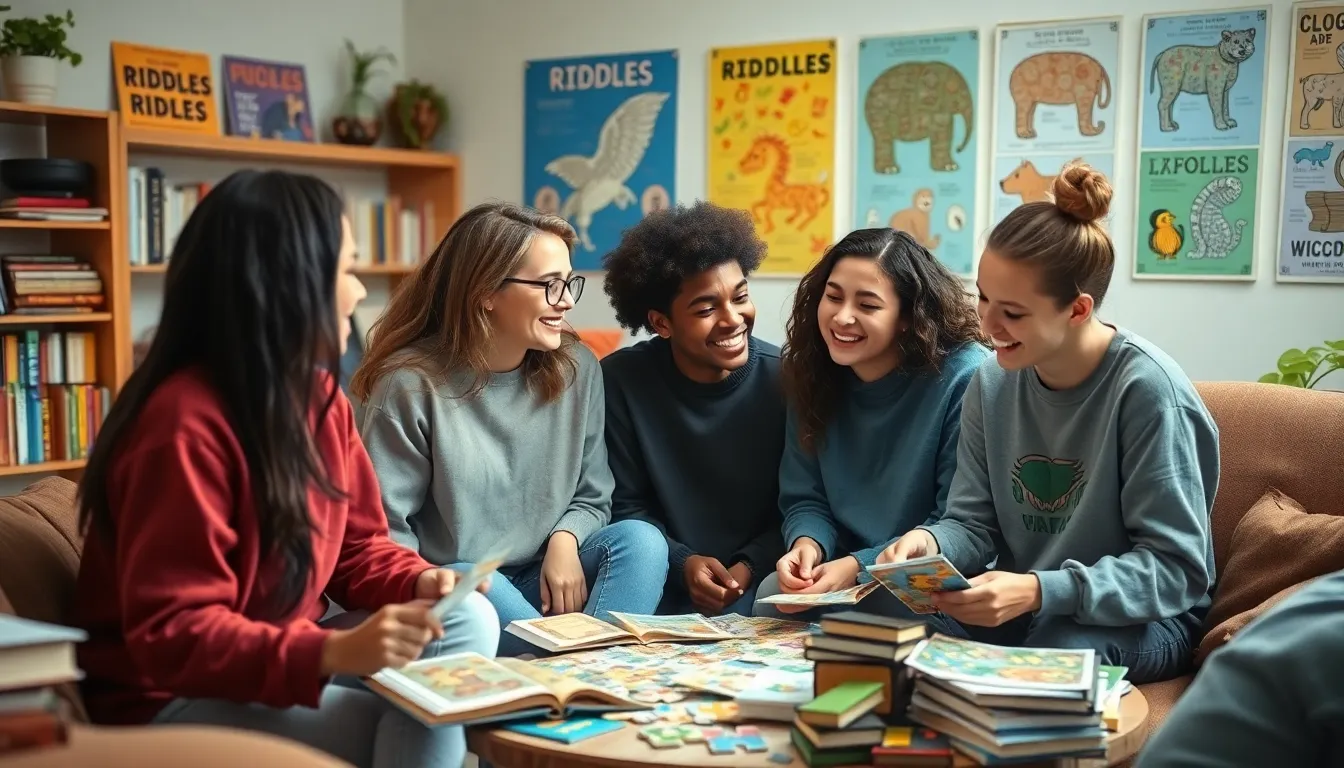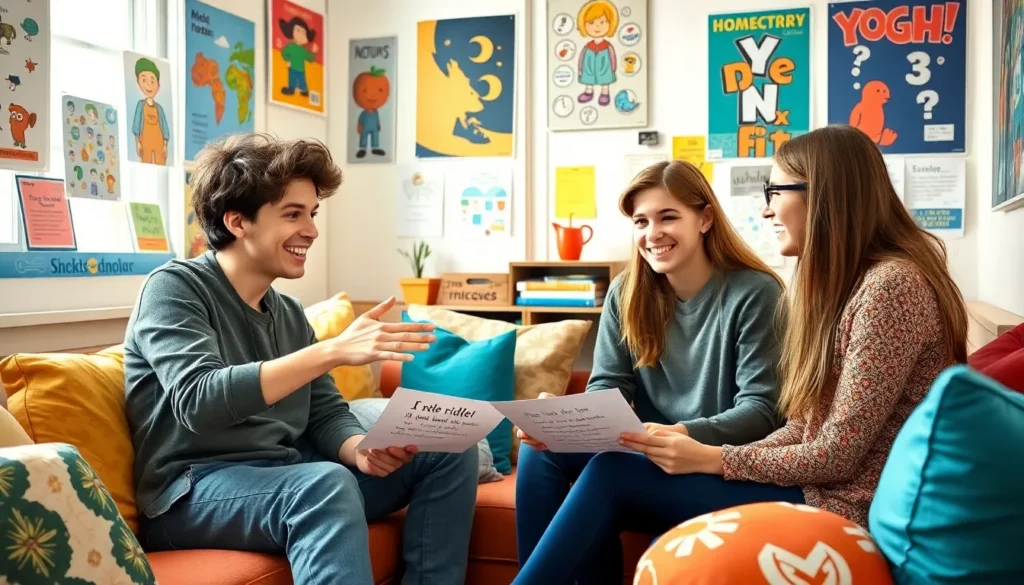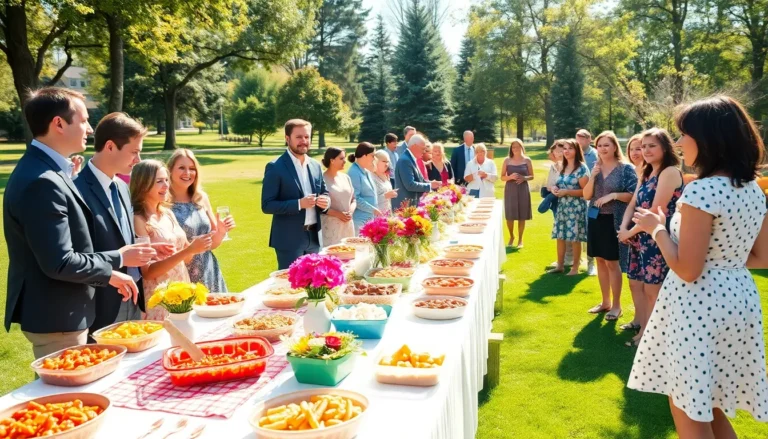Teenagers thrive on challenges that tickle their brains and spark their curiosity. Riddles are the perfect blend of fun and mental gymnastics, offering a playful way to engage their minds while having a good laugh. Who doesn’t love the thrill of cracking a clever puzzle and basking in the glory of their wittiness?
Table of Contents
ToggleUnderstanding Riddles For Teenagers
Riddles captivate teenagers by challenging their minds and nurturing curiosity. Engaging with riddles offers not only entertainment but also profound benefits for personal development.
Importance Of Riddles
Riddles enhance critical thinking skills, requiring teenagers to process information and formulate responses. They stimulate creativity while encouraging out-of-the-box thinking. Additionally, riddles foster social interaction when shared among peers, promoting teamwork and collaboration. Engaging with riddles cultivates patience, as teenagers learn to approach problems methodically instead of rushing to conclusions. Embracing a variety of riddles enriches their problem-solving repertoire.
Benefits For Cognitive Development
Cognitive development benefits significantly from solving riddles. Teens enhance their memory by recalling clues and revisiting solutions. Riddles boost analytical skills upon evaluating different interpretations and potential answers. Moreover, they improve language skills through exposure to new vocabulary and linguistic structures. Social skills also develop as teenagers participate in group discussions surrounding riddles, learning to express thoughts and listen to others. Overall, riddles serve as an enjoyable method to develop essential cognitive abilities while keeping teenagers engaged.
Types Of Riddles

Different types of riddles cater to various interests and skills. Each type provides unique challenges, making them suitable for teenagers seeking engaging mental exercises.
Classic Riddles
Classic riddles often feature clever phrasing and play on words. These timeless puzzles require critical thinking and creativity. For instance, “What has keys but can’t open locks?” prompts the answer: a piano. Engaging with classic riddles strengthens problem-solving abilities. Such riddles foster logical reasoning as teenagers explore multiple interpretations and solutions.
Themed Riddles
Themed riddles focus on specific subjects, enhancing both enjoyment and knowledge. Popular themes include nature, science, and holidays. An example is, “What gets wetter as it dries?” The answer, a towel, aligns with the everyday experience of teenagers. Themed riddles encourage exploration of diverse topics, boosting curiosity while providing relevant context. They spark conversations and enhance social interaction among peers.
Math Riddles
Math riddles incorporate numerical challenges alongside logical reasoning. These puzzles often require calculation or pattern recognition for solutions. An example includes, “I am an odd number. Take away one letter, and I become even. What number am I?” The answer is seven. Engaging with math riddles sharpens analytical skills. Such riddles promote resilience as teens navigate through complex problems, boosting confidence in their mathematical abilities.
How To Create Engaging Riddles For Teens
Creating engaging riddles for teens involves understanding their interests and using clever phrasing. Riddles that grab attention often incorporate relatable themes and playful language.
Tips For Crafting Riddles
Start with familiar topics that resonate with teenagers. Include current trends, popular culture, or common experiences. Use simple yet intriguing language to encourage curiosity. Consider incorporating humor or puns to enhance enjoyment. Structure the riddle to challenge their thinking but ensure the answer feels rewarding. Balance difficulty and accessibility, making it solvable without excessive frustration.
Testing Your Riddles
Testing riddles with a teenage audience ensures effectiveness. Gather a small group of friends or family members willing to provide feedback. Observe their reactions as they solve the riddles. Note the time it takes for them to arrive at the answer and whether they express frustration or enjoyment. Revise based on their feedback, tweaking wording or complexity as necessary. Aim for a broader appeal by considering different skill levels, ensuring all teens can participate.
Popular Riddles For Teenagers
Riddles engaging teenagers can stimulate their minds and provoke thought. Below are popular examples categorized by length.
Short Riddles
Short riddles provide quick challenges that keep teens thinking. For instance, “What has keys but can’t open locks?” The answer is “a piano.” Another example: “What comes once in a minute, twice in a moment, but never in a thousand years?” The answer is “the letter M.” These riddles encourage rapid thinking and spark curiosity, making them great for group activities or games.
Longer Riddles
Longer riddles typically offer more complexity and require deeper focus. For example, “I speak without a mouth and hear without ears. I have no body, but I come alive with the wind. What am I?” The answer is “an echo.” Another engaging riddle: “I can fly without wings. I can cry without eyes. Wherever I go, darkness flies. What am I?” The answer is “a cloud.” These riddles enhance critical thinking and promote teamwork, as teens often discuss clues and share insights while solving them.
Riddles are more than just fun puzzles for teenagers; they’re a powerful tool for cognitive development. By engaging with riddles, teens enhance their critical thinking skills and foster creativity while enjoying social interactions with peers. The variety of riddles available ensures that every teen can find something that piques their interest and challenges their mind.
As they solve riddles together, they not only develop problem-solving abilities but also improve communication and teamwork skills. This blend of mental exercise and social engagement makes riddles an ideal activity for teenagers looking to stimulate their minds while having fun. Encouraging this playful exploration of language and logic can lead to lasting benefits that extend beyond the riddle itself.






